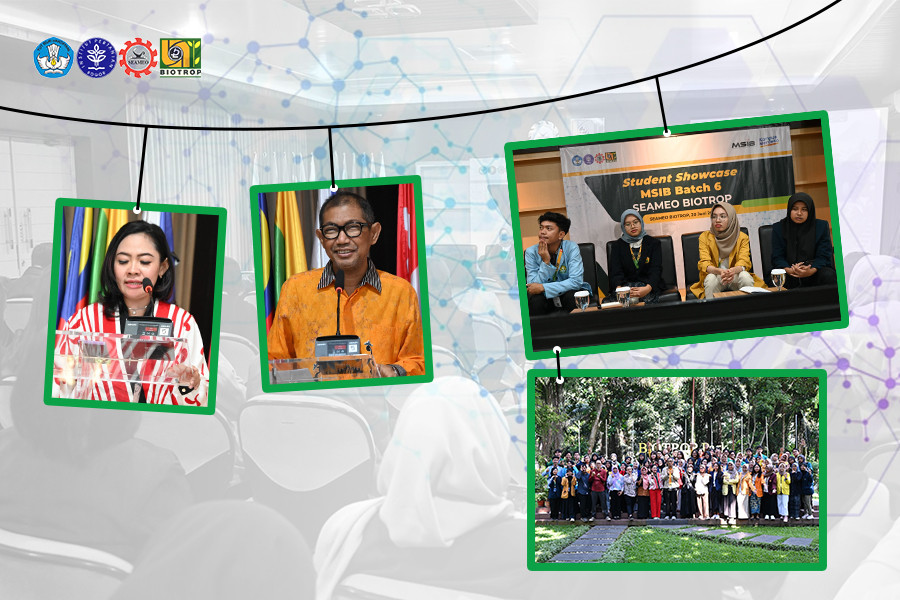After completing a 6-month internship program at SEAMEO BIOTROP, 60 students showcased their work at the Student Showcase MSIB Batch 6 SEAMEO BIOTROP on June 20, 2024. The event took place in the Jati and Mahoni Rooms at SEAMEO BIOTROP and was broadcast live via Zoom.
In her opening remarks, Dr. Dewi Suryani, the MSIB coordinator at SEAMEO BIOTROP, stated that 4,922 students applied, and BIOTROP accepted 60 students from 28 universities across Indonesia, including Sumatra, Java, Makassar, Bali, Mataram, Kalimantan, and Sultan Ageng Tirtayasa. The program, themed on tropical biodiversity management, covered four internship topics: LSO, MBT, PPB, and BIOTEK, running from February 16 to June 30, 2024.
Dr. Zulhamsyah Imran, Director of SEAMEO BIOTROP, emphasized the importance of agriculture for humanity and highlighted the role of participants as agents in preserving local biodiversity. "The outputs and modules produced are expected to serve as references for future development," he said. He further added, "This program not only enriches your knowledge but also prepares you to be leaders in the field of biodiversity management."
Dr. Purwadi, representing the faculty mentors, expressed gratitude to the mentors for their guidance and hoped that the knowledge gained would be shared with peers on campus.
Student representatives from each field presented their work. Dyah Retno from the University of Jember discussed the Land Sub-Optimal Management project, which included mini research on phosphate-solubilizing bacteria (PSB), arbuscular mycorrhizal fungi (AMF), gardening literacy modules and pocketbooks, updates to the BIOTROP Clinic website, BIOPOS production, and educational video production. The LSO subtopics included sub-optimal land management, land conservation and productivity, water restoration, organic fertilizer production, and information technology production and dissemination.
Taufikurrahman from the University of Riau presented various activities under Tropical Biodiversity Management, including integrated pest management, agroecosystem weed control, biodiversity risk management, essential oil production technology, and information production and dissemination technology. Activities included collection and preservation, weed inventory at SEAMEO BIOTROP, herbarium collection, biodiversity mapping, propolis production, updating the WikiBIOTROP database, essential oil production, and more.
Khonsa Taqiyyah from Jenderal Soedirman University reported on the Plant Biotechnology field, covering subtopics such as tissue culture, modern biotechnology, biotechnology product risk management, information production and dissemination technology, and modern biotechnology mini-projects. Outputs included teaching modules, practical guides, learning videos, infographics, and standard operating procedures.
Rismala Febryanti from Brawijaya University presented the results of the Sustainable Urban Agriculture internship, which included mini projects on hydroponics, precision farming, aquatics, agribusiness, mushroom cultivation, and container gardening.
Students also shared their feedback on the internship program. "This experience has been transformative," said Dyah Retno. "I have gained practical skills and a deeper understanding of biodiversity management." Taufikurrahman added, "The hands-on projects and mentor support were invaluable. I feel more prepared for my future career." Khonsa Taqiyyah highlighted the collaborative environment, stating, "Working with peers from different universities and backgrounds has broadened my perspective and enriched my learning experience."
In her opening remarks, Dr. Dewi Suryani, the MSIB coordinator at SEAMEO BIOTROP, stated that 4,922 students applied, and BIOTROP accepted 60 students from 28 universities across Indonesia, including Sumatra, Java, Makassar, Bali, Mataram, Kalimantan, and Sultan Ageng Tirtayasa. The program, themed on tropical biodiversity management, covered four internship topics: LSO, MBT, PPB, and BIOTEK, running from February 16 to June 30, 2024.
Dr. Zulhamsyah Imran, Director of SEAMEO BIOTROP, emphasized the importance of agriculture for humanity and highlighted the role of participants as agents in preserving local biodiversity. "The outputs and modules produced are expected to serve as references for future development," he said. He further added, "This program not only enriches your knowledge but also prepares you to be leaders in the field of biodiversity management."
Dr. Purwadi, representing the faculty mentors, expressed gratitude to the mentors for their guidance and hoped that the knowledge gained would be shared with peers on campus.
Student representatives from each field presented their work. Dyah Retno from the University of Jember discussed the Land Sub-Optimal Management project, which included mini research on phosphate-solubilizing bacteria (PSB), arbuscular mycorrhizal fungi (AMF), gardening literacy modules and pocketbooks, updates to the BIOTROP Clinic website, BIOPOS production, and educational video production. The LSO subtopics included sub-optimal land management, land conservation and productivity, water restoration, organic fertilizer production, and information technology production and dissemination.
Taufikurrahman from the University of Riau presented various activities under Tropical Biodiversity Management, including integrated pest management, agroecosystem weed control, biodiversity risk management, essential oil production technology, and information production and dissemination technology. Activities included collection and preservation, weed inventory at SEAMEO BIOTROP, herbarium collection, biodiversity mapping, propolis production, updating the WikiBIOTROP database, essential oil production, and more.
Khonsa Taqiyyah from Jenderal Soedirman University reported on the Plant Biotechnology field, covering subtopics such as tissue culture, modern biotechnology, biotechnology product risk management, information production and dissemination technology, and modern biotechnology mini-projects. Outputs included teaching modules, practical guides, learning videos, infographics, and standard operating procedures.
Rismala Febryanti from Brawijaya University presented the results of the Sustainable Urban Agriculture internship, which included mini projects on hydroponics, precision farming, aquatics, agribusiness, mushroom cultivation, and container gardening.
Students also shared their feedback on the internship program. "This experience has been transformative," said Dyah Retno. "I have gained practical skills and a deeper understanding of biodiversity management." Taufikurrahman added, "The hands-on projects and mentor support were invaluable. I feel more prepared for my future career." Khonsa Taqiyyah highlighted the collaborative environment, stating, "Working with peers from different universities and backgrounds has broadened my perspective and enriched my learning experience."
 Monday, 01 July 2024 on 11:42am
Monday, 01 July 2024 on 11:42am
